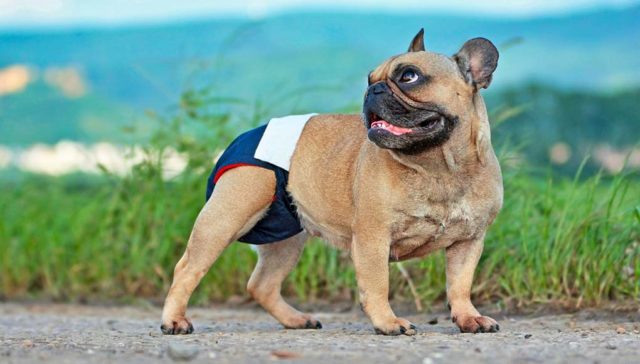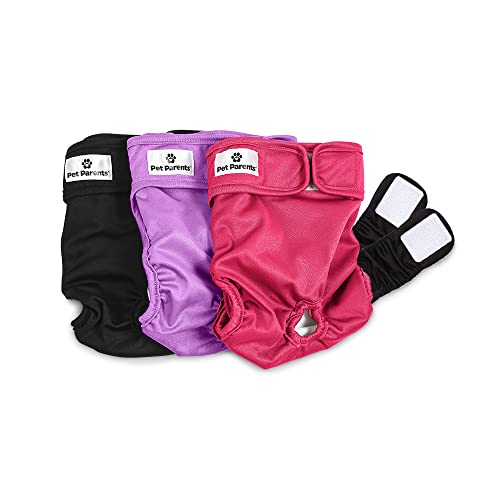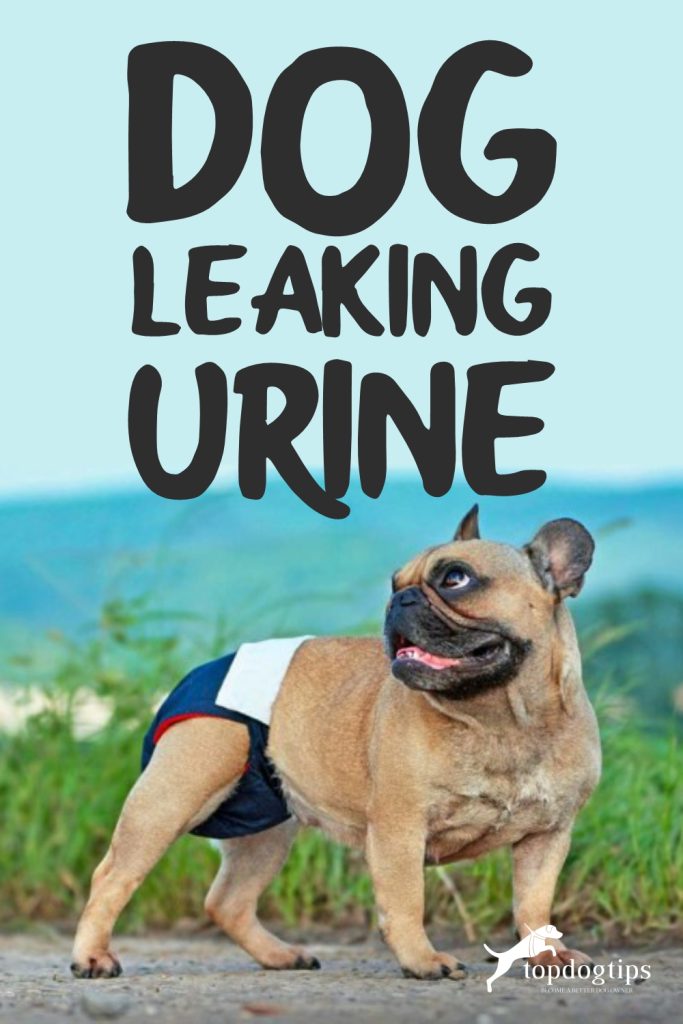
Table of Contents
- 5 Causes of a Dog Leaking Urine
- 1. Spayed females can cause dogs to leak urine
- 2. Geriatric dog leaking urine
- 3. Dog leaking urine because of damage to the pudendal nerve
- 4. Congenital disabilities can cause a dog incontinence
- 5. Diseases can cause increased urination and a dog leaking urine
- Other possible health problems that may cause a dog to leak urine can be:
- Symptoms of Urinary Incontinence in Dogs
- How This Condition is Diagnosed
- Treatments for a Dog Leaking Urine
- How to Prevent Urinary Incontinence in Your Dog
- Possible Complications
- Dogs Prone to Leaking Urine
- Supplies You May Need if Your Dog has Leaking Urine
- Conclusion
It is not unusual that older, primarily female dogs, suffer from urinary incontinence (dogs leaking urine) when they have no control over the bladder (1).
The reasons for the involuntary passing of urine can be various, but hormone dissemblance is the most common cause for this condition in spayed dogs.
In some cases, this condition can be connected with the bladder itself and other infections, medicines, or obesity (2).
Urinary incontinence in dogs includes a wide range of leaking, from occasional small urine leaks to a sudden release of large quantities of urine.
5 Causes of a Dog Leaking Urine
There are numerous reasons why dogs leak urine uncontrollably, and most of them are unavoidable symptoms of aging or disease.
1. Spayed females can cause dogs to leak urine
In female dogs, especially spayed ones, hormone-induced urinary incontinence is the most commonly diagnosed condition (3).
Even though estradiol concentration may vary even in healthy dogs, the primary reason for incontinence is often a lack of this form of estrogen (4).
2. Geriatric dog leaking urine
When the dog gets old, they may lose control of their bladder, either partially or fully, since the urethral sphincter weakens.
It is common in medium and large breeds when they get older, but age is not always the only reason.
Often, dogs may suffer from an infection of the urinary tract. Therefore, visiting the vet is highly recommended to confirm if there is an underlying health issue.
Also, it is not rare that some congenital abnormalities are revealed only when the dog grows older.
3. Dog leaking urine because of damage to the pudendal nerve
This condition occurs in older dogs with joint disease or arthritis (5).
When a dog's pudendal nerve becomes affected by trauma, that dog's bladder cannot close entirely, and urine leakage will appear (6).
4. Congenital disabilities can cause a dog incontinence
These structural abnormalities may cause incontinence even in puppies (7).
It is common with some breeds, including Siberian Huskies, Wirehaired Fox Terriers, Labrador Retrievers, Miniature Poodles, Corgis, Collies, and Westies (8).
5. Diseases can cause increased urination and a dog leaking urine
Some health issues, such as kidney disease or diabetes, may cause increased urination in dogs, urinary tract infections, and consequential incontinence.
Other possible health problems that may cause a dog to leak urine can be:
- Infection of the bladder
- Bladder stones
- Urethral obstruction
- Hyperadrenocorticism
- Prostate disorders
- The trauma of the CNS (brain and spinal cord)
- Spinal degeneration in German shepherds
- Cancer
- Medications
Symptoms of Urinary Incontinence in Dogs
In most cases, the dog is entirely unaware of leaking urine. The general symptoms indicating that there is a problem include:
- Dripping urine underneath the dog while relaxing or sleeping
- Irritated and red skin around the dog's genitals
- Excessive licking of the private area
- The space for sleeping is always contaminated with urine
How This Condition is Diagnosed
It is not a problem to diagnose leaking urine in dogs since this condition is visible to everyone.
However, visiting a vet for a physical exam is recommended because determining the underlying cause is crucial.
Checking urine and blood, diagnostic tests, and additional screening will help the vet look at the problem (9).
The necessary tests will depend on the dog's age and the presence or absence of specific symptoms.
To help your veterinarian make an adequate diagnosis, you need to give precise answers to the following questions:
- Whether the dog urinates normally
- How much water does the dog usually drink
- The age of the dog when leaking urine appeared for the first time
- If it often happens at rest or during activity
- Previous illnesses and neutering
- Possible signs of nervous system diseases
- Used medications
Treatments for a Dog Leaking Urine
A dog's leaking urine therapy is always based on a specific diagnosis and the underlying condition leading to this disorder.
Luckily, approximately 90% of incontinence dogs respond to adequate treatment.
A dog's incontinence is not an emergency in most cases, but it is better to take your pet to the vet when the first signs of illness occur.
It may facilitate healing and accelerate the disappearance of symptoms.
Infection. If the primary reason for a dog leaking urine is a bladder or urinary tract infection, prescribed antibiotics will quickly solve both the disease and leakage.
Hormonal imbalance. When the dog has an issue with hormone-responsive incontinence, phenylpropanolamine or collagen injections will increase muscle tone and control regular urinary retention.
In the case of lacking estrogen, it is necessary to provide hormonal support to female dogs. The best way to increase the level of estrogen is with medications such as Incursion.
An anatomical abnormality, urethral obstruction, or bladder stone. In such a case, surgery is often recommended, and sometimes, it's the only solution.
Other diseases. If the dog suffers from kidney disease, diabetes, prostate disorders, or neurological disease, the therapy will solve that primary cause by stopping urine leaking.
When it is impossible to determine the specific cause of incontinence, the best way to help your dog is to have the vet prescribe drugs such as estrogen, phenylpropanolamine, or ephedrine.
They will increase the tone of the muscles of the bladder and improve the overall condition.
Since some of these medications may cause side effects, starting the treatment with low doses is recommended.
When the dog responds to medications adequately, the leaking will stop within several days.
If that is not the case, the vet may recommend additional diagnostics and tests or refer the dog to another specialist.
How to Prevent Urinary Incontinence in Your Dog
Incontinence in dogs is not entirely preventable. However, there are ways to help your pet manage this condition once it appears, including:
- Taking the dog for walks in the morning and more frequently during the day to provide conditions for regular urinating
- Using training pads to teach a puppy or senior dog to lie down and sleep on easy-to-clean surfaces from the very beginning
- Preventing infection by adequately cleaning the dog
- Regular changing towels and blankets in your dog's favorite resting spot
- Placing waterproof pads under the dog's bedding
- Using dog diapers
Possible Complications
In most cases, leaking urine in dogs is treatable. Unfortunately, it is possible to face progression of primary bladder or kidney infections in some cases.
As a result, an issue with a skin infection may occur in the area in direct contact with urine.
Dogs Prone to Leaking Urine
Even though incontinence can affect any dog regardless of their age, gender, or breed, there are some dogs more prone to this disease, including:
- Older spayed females
- Dog breeds such as Siberian Huskies, Wirehaired Fox Terriers, Labrador Retrievers, Miniature Poodles, Corgis, Collies, Westies, Doberman Pinschers, Cocker spaniels, and Old English Sheepdogs
Supplies You May Need if Your Dog has Leaking Urine
Whether you have a puppy, a senior dog, or a female dog with hormonal or other health problems causing them to leak urine, you can employ a few things to help manage this condition alongside the treatment plan devised by your veterinarian.
| Preview | Product | Rating | |
|---|---|---|---|

|
Zesty Paws Cranberry Bladder Bites for Dogs -... | 12,322 Reviews | Check Price |

|
Pet Parents Premium Washable Dog Diapers &... | 39,416 Reviews | Check Price |

|
BESTLE Extra Large Pet Training and Puppy Pads Pee... | 9,668 Reviews | Check Price |

|
Rocco & Roxie Supply Co. Stain & Odor Eliminator... | 110,835 Reviews | Check Price |
Conclusion
Even though the primary cause of a dog leaking urine directly determines the prognosis of incontinence, it's treatable in most cases.
How long the dog will need to start controlling urination again may vary.
However, regular treatment with adequate medications and necessary lifestyle changes may help in managing the problem successfully.
READ NEXT: How to Make a Dog Diaper
Disclosure: We may earn affiliate commissions at no cost to you from the links on this page. This did not affect our assessment of products. Read more here and find full disclosure here.













